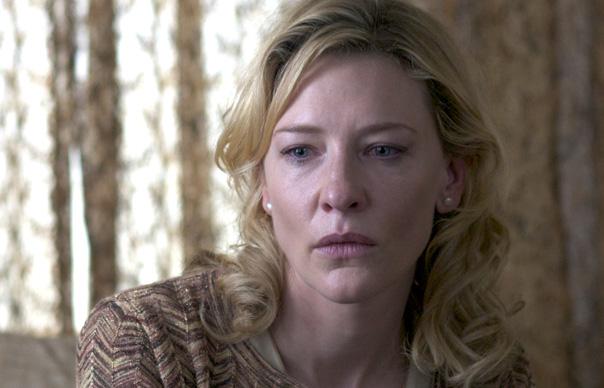Cate Blanchett has a breakdown in 'Frisco in Woody Allen's latest... I should probably come clean and admit that Woody Allen’s earlier, funnier films – or, really, even his serious, black and white ones – passed me by. I quite liked the joke in Sleeper about scientists discovering that McDonald’s was good for you, but that’s pretty much where the director and I part company. But from Vicky Crinstina Barcelona onwards, I’ve found myself in the unusual position of enjoying his films. A Woody-come-lately, perhaps, but at least I’m here now. And in many respects, Blue Jasmine continues the director’s current upward trajectory: is a very good film, but it is also deeply lop-sided. At its centre – and, really, its top, bottom, sides and outerlying regions – is Cate Blanchett as Jasmine, a glossy New York socialite who turns up at her adoptive sister’s in San Francisco, her life in ruins. “There are only so many traumas a person can withstand until they take to the streets and start screaming.” Ginger takes Jasmine in, and what ensues is essentially a portrait of a woman on the brink. In flashback, we see Jasmine’s previous life, as she enjoys her husband’s wealth while looking the other way regarding it its provenance. She self-medicates with pills and vodka, presumably to blot out awareness of her husband’s crooked business dealings and his extramarital activities. In present day San Francisco, meanwhile, Jasmine finds herself encouraged by Ginger to go on double dates, take a job as a dental assistant, and go back to college. Allen’s writing is lucid and – in depicting the sister’s relationship – flinty. Blue Jasmine isn’t an especially funny film – though it makes extremely good use of two stand-up comics: Louis CK, as a sound engineer who seduces Ginger, and Andrew Dice Clay, as Ginger’s ex-husband. Clay – where has he been? – delivers one of the film’s best performances, burned and unforgiving after being ripped off by Jasmine’s husband, Hal. Meanwhile, Alec Baldwin, as Hal, is also superb – much as you’d imagine – and Sally Hawkins is breezy and likable as Ginger. But Blue Jasmine consists almost entirely of supporting performances, with everyone orbiting Blanchett’s modern day Blanche DuBois, wallowing in her epic self-deceptions. Blanchett is being tipped for Oscar glory, and this is surely a very good, very committed performance (if a little self-consciously so). But as accomplished as Blue Jasmine is, I think it could have been a more rounded film had Woody Allen given more room elsewhere. There are many shades of blue; not all of them are represented here. Michael Bonner Follow me on Twitter @MichaelBonner.
Cate Blanchett has a breakdown in ‘Frisco in Woody Allen’s latest…
I should probably come clean and admit that Woody Allen’s earlier, funnier films – or, really, even his serious, black and white ones – passed me by. I quite liked the joke in Sleeper about scientists discovering that McDonald’s was good for you, but that’s pretty much where the director and I part company.
But from Vicky Crinstina Barcelona onwards, I’ve found myself in the unusual position of enjoying his films. A Woody-come-lately, perhaps, but at least I’m here now. And in many respects, Blue Jasmine continues the director’s current upward trajectory: is a very good film, but it is also deeply lop-sided. At its centre – and, really, its top, bottom, sides and outerlying regions – is Cate Blanchett as Jasmine, a glossy New York socialite who turns up at her adoptive sister’s in San Francisco, her life in ruins. “There are only so many traumas a person can withstand until they take to the streets and start screaming.” Ginger takes Jasmine in, and what ensues is essentially a portrait of a woman on the brink.
In flashback, we see Jasmine’s previous life, as she enjoys her husband’s wealth while looking the other way regarding it its provenance. She self-medicates with pills and vodka, presumably to blot out awareness of her husband’s crooked business dealings and his extramarital activities. In present day San Francisco, meanwhile, Jasmine finds herself encouraged by Ginger to go on double dates, take a job as a dental assistant, and go back to college. Allen’s writing is lucid and – in depicting the sister’s relationship – flinty.
Blue Jasmine isn’t an especially funny film – though it makes extremely good use of two stand-up comics: Louis CK, as a sound engineer who seduces Ginger, and Andrew Dice Clay, as Ginger’s ex-husband. Clay – where has he been? – delivers one of the film’s best performances, burned and unforgiving after being ripped off by Jasmine’s husband, Hal. Meanwhile, Alec Baldwin, as Hal, is also superb – much as you’d imagine – and Sally Hawkins is breezy and likable as Ginger. But Blue Jasmine consists almost entirely of supporting performances, with everyone orbiting Blanchett’s modern day Blanche DuBois, wallowing in her epic self-deceptions. Blanchett is being tipped for Oscar glory, and this is surely a very good, very committed performance (if a little self-consciously so). But as accomplished as Blue Jasmine is, I think it could have been a more rounded film had Woody Allen given more room elsewhere.
There are many shades of blue; not all of them are represented here.
Michael Bonner
Follow me on Twitter @MichaelBonner.



